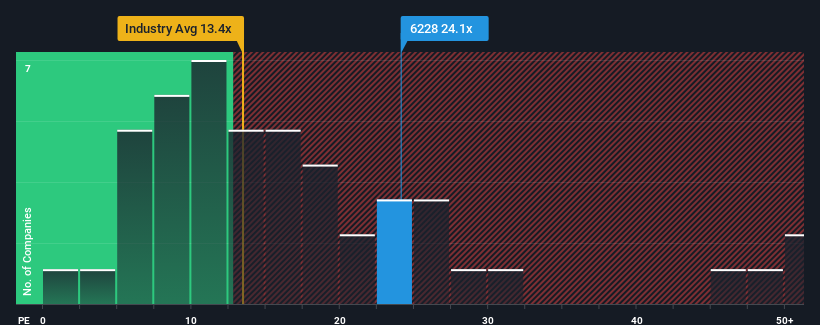- Japan
- /
- Semiconductors
- /
- TSE:6228
J.E.T. Co., Ltd.'s (TSE:6228) 39% Price Boost Is Out Of Tune With Earnings
J.E.T. Co., Ltd. (TSE:6228) shares have had a really impressive month, gaining 39% after a shaky period beforehand. But the last month did very little to improve the 56% share price decline over the last year.
After such a large jump in price, J.E.T's price-to-earnings (or "P/E") ratio of 24.1x might make it look like a strong sell right now compared to the market in Japan, where around half of the companies have P/E ratios below 13x and even P/E's below 9x are quite common. However, the P/E might be quite high for a reason and it requires further investigation to determine if it's justified.
For example, consider that J.E.T's financial performance has been poor lately as its earnings have been in decline. One possibility is that the P/E is high because investors think the company will still do enough to outperform the broader market in the near future. You'd really hope so, otherwise you're paying a pretty hefty price for no particular reason.
View our latest analysis for J.E.T

Does Growth Match The High P/E?
In order to justify its P/E ratio, J.E.T would need to produce outstanding growth well in excess of the market.
Taking a look back first, the company's earnings per share growth last year wasn't something to get excited about as it posted a disappointing decline of 53%. As a result, earnings from three years ago have also fallen 55% overall. Therefore, it's fair to say the earnings growth recently has been undesirable for the company.
Comparing that to the market, which is predicted to deliver 13% growth in the next 12 months, the company's downward momentum based on recent medium-term earnings results is a sobering picture.
With this information, we find it concerning that J.E.T is trading at a P/E higher than the market. Apparently many investors in the company are way more bullish than recent times would indicate and aren't willing to let go of their stock at any price. Only the boldest would assume these prices are sustainable as a continuation of recent earnings trends is likely to weigh heavily on the share price eventually.
What We Can Learn From J.E.T's P/E?
The strong share price surge has got J.E.T's P/E rushing to great heights as well. While the price-to-earnings ratio shouldn't be the defining factor in whether you buy a stock or not, it's quite a capable barometer of earnings expectations.
Our examination of J.E.T revealed its shrinking earnings over the medium-term aren't impacting its high P/E anywhere near as much as we would have predicted, given the market is set to grow. Right now we are increasingly uncomfortable with the high P/E as this earnings performance is highly unlikely to support such positive sentiment for long. Unless the recent medium-term conditions improve markedly, it's very challenging to accept these prices as being reasonable.
It is also worth noting that we have found 1 warning sign for J.E.T that you need to take into consideration.
Of course, you might also be able to find a better stock than J.E.T. So you may wish to see this free collection of other companies that have reasonable P/E ratios and have grown earnings strongly.
New: Manage All Your Stock Portfolios in One Place
We've created the ultimate portfolio companion for stock investors, and it's free.
• Connect an unlimited number of Portfolios and see your total in one currency
• Be alerted to new Warning Signs or Risks via email or mobile
• Track the Fair Value of your stocks
Have feedback on this article? Concerned about the content? Get in touch with us directly. Alternatively, email editorial-team (at) simplywallst.com.
This article by Simply Wall St is general in nature. We provide commentary based on historical data and analyst forecasts only using an unbiased methodology and our articles are not intended to be financial advice. It does not constitute a recommendation to buy or sell any stock, and does not take account of your objectives, or your financial situation. We aim to bring you long-term focused analysis driven by fundamental data. Note that our analysis may not factor in the latest price-sensitive company announcements or qualitative material. Simply Wall St has no position in any stocks mentioned.
About TSE:6228
J.E.T
Engages in the design, development, manufacture, sale, and after-sales maintenance service of semiconductor cleaning equipment in Japan, South Korea, China, Taiwan, and internationally.
Excellent balance sheet and good value.
Market Insights
Community Narratives



